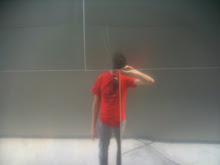This year's Pop Conference at the Experience Music Project (EMP) explored the relationship between music and technology. Beginning April 15th, the conference consisted of a series of panel discussions and readings of academic papers. The participants ranged from journalists to academics, with EMP curators, and self-styled critics filling out the weekend's program. This was my first year attending, and I highly enjoyed the arguments and discussions. I would like to share just some of the highlights with you:
1. The player piano may be the first digital technology used in music. It's fascinating history is interwoven with the history of textile manufacturing, the piano rolls having a common ancestor in the punch cards of Jacquard's looms. For more on this, check out the work of David Suisman.
2. Post-punk musicians in the early 1980s Great Britain used reverb to emphasize their themes of isolation and "deep personal alienation." Bands like the Cure and Wire are great examples, as explained by Theo Cateforis in his presentation "Dark Spaces and Empty Places'': Ambient Reverb and the Meanings of British Post-Punk." The Cure's All Cats are Grey uses reverb to create the sensation of listening in a large cave. The sense of distance created by the reverb emphasizes the lyrics:
In the caves
All cats are grey
In the caves
The textures coat my skin
In the death cell
A single note
Rings on and on and on
Cateforis made sure to point out that these bands may not have always been aware of what they were doing, but his work definitely helped deepen my appreciation of the two bands above.
3. Bands like Vampire Weekend and Dirty Projectors are often accused of appropriating African styles of guitar and percussion for their own personal gain. While that never really rang true for me, Banning Eyre, contributor to the radio program Afropop Worldwide, argues that we need to reevaluate these bands with a different perspective. Eyre pointed out that the kids in Vampire weekend grew up listening to African artists like Fela Kuti and Ali Farka Toure in their own homes, making different African musical styles personal in a way it never was for previous generations of Americans. Besides this, it's pretty clear that Vampire Weekend and similar bands are melding multiple styles to create their own unique sound.
4. The phrase “no homo” commonly used in hip hop is meant to assert black masculinity within the context of lyrical and physical expressions that typically signify femininity. In other words, whenever rappers are acting queer or saying queer-related things, they need to make sure they tell us that they are not in fact queer. What is most saddening is that every day I see twelve and thirteen year old kids who learn how to be men from rap videos. The other day I had a student ask me “why you on my dick?” when I told him he needed to get off the computer because he was only using it to look at women dancing at clubs.The abstract for Leah Pogwizd's paper on this topic is here.
5. Music critics should not be moderators.
6. Journalists who write about music are much more interesting than academics.
Subscribe to:
Post Comments (Atom)

No comments:
Post a Comment